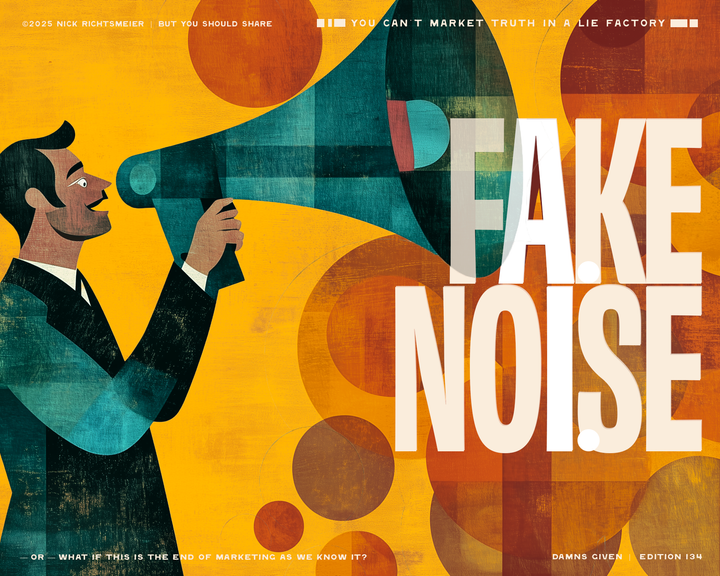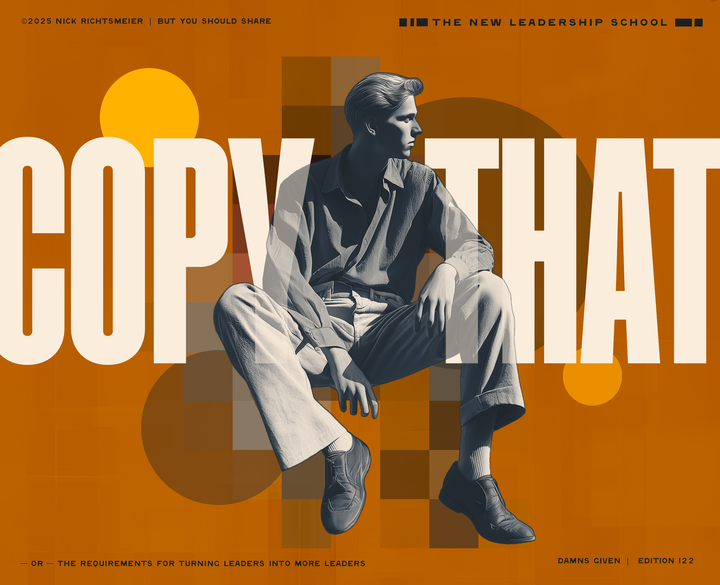Weaponized nostalgia: Four things I finally learned in 2024
The fundamental culture that produces reliable business growth has dramatically changed. And it means we've got to learn lessons we've been avoiding for years. These were my hard lessons in 2024.

FWD Edition 112 - Four things I finally learned in 2024
2024 has been a year of peak nostalgia, particularly for the mid-2010s. Our politics took us back pre-pandemic. Our discourse on marketing and growth is firmly grounded in the antics of 2016. Millions flocked to BlueSky to try and create 2015 of Twitter they couldn't live without.
Nostalgia, in most cases, is weaponized grief. We are easily held to fantasies of the past, litigating battles long-since history, pulling us from the arena of making the world that comes from next.
All the while, the real world moves forward. Children age. Elderly die. Cultures evolve. Economies shift. Culture absorbs a new generation and abandons another. The real world is always in forward motion, no matter how our hearts or our slogans draw us back into the past.
The lessons I'm going to share with you today, four that I learned in 2024, were years in the making, but to get there we've got to agree on some premises:
- We are in the aftermath of the Long Digital Decade (2008-2022). In 2008, the Internet elected its first president. Meta hired advertising wunderkind Sheryl Sandberg to monetize everything, and America's financial center moved from Manhattan to Silicon Valley as Wall Street buckled. For the next 14 years, we were baptized into internet religion and the promise of endless connection and commerce, dispelled when Elon Musk bought Twitter (the Internet's holy temple) and turned it into a propaganda machine, and Facebook rebranded to Meta, capitulating to a Web 3.0 that never happened. We are now firmly post-digital, triaging a world as dependent on the internet as electricity and running water. The internet is not new; it is required.
- Since then, we've been flailing about, trying to hold on to the memory of the Long Digital Decade. Digital innovation is no longer consumer-friendly but consumer-extractive, fully committed to using its users as products instead of customers. As we learned from Hank Green last week, today's web is a trust-eating machine. Businesses and institutions that have outsourced trust-building to it are lost at sea as their audiences shrink, their tactics underperform, and the arbitrage of attention becomes a blood sport that only the largest companies or the most draconian methods can win.
- Uncertainty is the new normal. Institutions will continue to scramble for their preferred past, creating structural uncertainty about what happens next, accentuated by the U.S. administration committed to dismantling any recent sense of normalcy. Many view this "creative destruction" as a positive. Time will tell. In the process, it will cement unknowns for at least four years while nostalgia tries to hold stasis between the rewritten past and the unknowable future. Ventures will be trapped in the in-between, unable to delay strategic thinking any further than they have already, holding out for a clarity that is not coming.
I've tried to summarize what I've written about extensively before so you understand the backdrop of the four false beliefs I finally let go of this year, and what I learned instead:
- Founders are running the businesses they want; they just need help growing them.
- Businesses need better marketing to grow.
- Marketers need more authority to lead.
- The knowledge business—advice, education, innovation—is primed for opportunity.
I have held on to my own wistful nostalgia, trying to make them true. But they aren't, and it's consequential for all of us. While we will hit some rough patches in addressing these today, there will be—for a courageous few—good news at the end.
False Belief #1: Founders are running the businesses they want
When I joined the Pantheon of Consultants™️, I started with a premise: founders generally ran the businesses they wanted to run; they just needed some extra tools and perspective to help grow them. It was a license to stay at the margins of problems, too bad it's not true.
Most founders get into a business because they understand The Thing. They know how to give advice or plumb a faucet or build an app. With grit and entrepreneurial spirit, they build a business with other people doing The Thing. The good ones learn as they go, figure out some stuff along the way, hire well. Eventually:
- They are forced to manage the business of The Thing and don't have any particular experience managing people, processes, or strategy.
- They become beholden to the employees, customers, and investors who depend on them. The business becomes layers of obligation rather than the freedom that made them entrepreneurs.
- The business no longer works like it did when it started. They are now stuck solving problems they don't like to reach goals they're not even sure they want.
In short, most founders are trapped in their success. Beneath their prison are the chaotic waters of cultural change described above. Growth ceilings are not a function of marketing or sales; they are structural to the business and, in many cases, deeply tied to the founder's personality.
Until this year, I tried to build services supporting founders without disrupting them. Pragmatically, t was easier to provide an additive service that didn't question the fundamentals. Except everywhere we looked, the fundamentals were causing the problems. I've seen firsthand how our best growth strategy work can easily crash against the rocks of leadership out of sync with its strategy.
Leaders are the lever and the limit of growth. If the leader doesn't change, the outcomes won't either. Today, our work is about liberating founders to do the job only they can do, releasing the business's growth engine, and breaking the cycle of founder entrapment that keeps ventures stuck. Of course, this only works for founders willing to look in the mirror and see both the problem and solution in themselves.
False Belief #2: Businesses need better marketing to grow.
Since I've sold a lot of marketing services in the last six years, this one was a hard pill to swallow. As LinkedIn will happily tell you, there are marketing problems everywhere. People are sending the wrong emails, they are doing too much SEO, not enough, the wrong SEO, they are buying ads on the wrong platform, they aren't buying enough ads, they need better blogs, they should have a podcast, they should get back to face-to-face events, their website sucks.
Given this cacophony of criticism, you might think we have a shortage of good marketing. I thought that, too, when I first set out.
The truth is the market is overproducing a mountain of perfectly serviceable marketing. The platform inefficiencies and speed of change that made the Long Digital Decade a marketer's playground are gone. The hunt for "ROI" is mostly a hunt for validation that all of this posting and clicking is worth the effort, particularly when your new agency's primary value proposition is that your old agency was doing it wrong.
Do some organizations need to do more table-stakes marketing? Yes.
Do some need to uplevel slightly to meet basic competitive requirements? Sure.
Will any of this unlock the growth barriers they are facing? Almost assuredly, no.
Health and growth are now structural problems, not tactical ones, and adding more marketing is only buckling the existing pylons. Ventures like yours now live in a sea of "just to show up" requirements and technological bloat created by the Long Digital Decade. These swirl around a leadership team struggling for certainty in a cultural milieu, spawning endless uncertainty. None of this will be solved by better messaging or more blogs.
Since creative work has often been ghettoized into marketing, I've lived in the marketing space off and on, if only to show people the power of creativity to produce business outcomes. One client ally from this past year said, "Nick, it seems you think everything is marketing." If I'd had this clarity at the time, I would have responded:
"No, marketing is an operational thing. Creative leadership is everything. It's just most senior leaders are so terrified of creativity that they park it in marketing to make PowerPoint decks and get clicks on the internet instead of using it to upend their structural issues as they should."
False Belief #3: Marketers just need more authority to lead.
Given all of the above, I've spent a lot of time arguing that if you just gave those creatives more influence over strategy, magic would happen.
I wanted this one to be true so badly. But it's not.
It's not just authority that has been stripped from the career development of nearly all marketers. It's access to the decision-making. They simply haven't been in the room. Most Directors of Marketing don't have full budget access. Many marketing heads have never been in an annual strategic growth session. If they have, every decision being made in front of them is new, and they are observers by default.
During the Long Digital Decade, the discipline became the purveyor of hacks, platform tricks, impossible-to-discern analytics, and debatable attribution models trying to give some click credit for that "Marketing Qualified Lead" that sales could then complain about.
Because creativity is seen as unserious everywhere else, some of the few creative thinkers in most firms sit in the marketing discipline. Creativity, instead of being recognized for what it is—the only disruptive force that can heal the flailing status quo—is seen as an arts and crafts project, with marketers infantilized to the kid's table, making signs, and hosting the company picnic.
Should someone solve this? Absolutely.
Will it get solved in time for your venture to break its growth ceiling? No way. Structural growth problems, powered by frustrated founder leaders, will only be solved by creative catalysts at the structural level of the business.
False Belief #4: The knowledge business—advice, education, innovation—is primed for opportunity.
Gah, you guys. I hate this one. I grew up in an unlocked world because smart people could leverage their smartness to do more than be a doctor or a lawyer. We could be strategists, advisors, community organizers, transformational educators, inventors of the future. The business of knowledge has been an animating feature of my whole career. So suffice to say, accepting the signs of its stagnation and decline has taken me a lot of time to accept.
As broad industries—advice, education, innovation—are all past their peak, either shrinking or consolidating, and in many cases abandoning their mandate in order to survive, pay their shareholders, or both. Let's take them blow-by-blow:
Advice (as exemplified by RIAs): At the time of writing, a summit of RIA leaders acknowledged what I wrote about months ago: The industry's consolidative streak with PE-powered M&A directly challenges its founding commitment to client-centricity. The return-on-equity demands of private equity far outstrip the expectations of founding owners, turning personalized service into streamlined departments and automation. The industry is consolidating and recentering its priorities from clients to returns. Certainly, individual firms are excepted by they are now swimming upstream.
Education: The problems here are well known. Culture has turned against Higher Ed as a tool for social progress, fewer students are enrolling, and the business model has never seen harder times. All while, societally, the demand for integrative-thinking, leadership-oriented, knowledgeable citizens has never been more important. Many college presidents have tried to frame this as a generational demographic shift. It's time to frame it as an existential threat to a fundamental pillar of Western society.
Innovation: 15 years ago, if you wanted to change the world, the call was to STEM. You could be a part of the most significant projects solving world-shifting problems. Today, you are more likely to be one tiny cog doing spellcheck on some AI-written code for an LLM agent for walmart.com or, if lucky, engineering the cupholder for a billionaire's dream of living on Mars. The gap between innovative thinking and the actual problems that impact society is often miles wild. Again, exceptions exist, but structurally, we are not using our best minds for our most challenging problems.
I've invested years of my career in these industries because I believed in their inherent worth and capacity to shape the future. And while the fundamental premise of each retains that, again, we are up against structural challenges. Anti-intellect, anti-nuance, anti-expertise is the populist fuel driving our cultural milieu right now. And it's not going to shift any time soon due to the fundamentals of the Long Digital Decade.
All three of these industries are mired in the failed experiments and false narratives of the Long Digital Decade, playing out internal battles that don't advance their collective worth.
As industries lose their ability to create the future, the possibility falls to individual ventures and leaders, which gets us to our first glimpses of hope for what is to come.
The Truth Will Set You Free
The truth is, my work has had increasing frustration over the past couple of years. I entered 2024 knowing some mental reset would be necessary. I, too, was a founder trapped by my good intentions.
This year, I committed to holding no cow as sacred. If bovine blood was to be spilt, let it run freely... steaks on the barbie.
And that's how I got here. I looked fiercely at assumptions that had set the stage for the first era of Culturecraft and learned lessons my self-made narratives were protecting me from. Along the way, I was reminded of what I love about being a leader: making where there is unmade.
I'm not a futurist. I cannot tell you what the next five years will hold. (Though in next week's Edition, I will undoubtedly make some claims about what next year will bring.) For today, I can tell you what will be required to make what's next:
A quorum of the willing.
Every discipline that wishes to have a say in how things go needs 5-10% of its leaders to come together and imagine, risk, try, fail, and reinvent a version we have not yet seen. This will require stoic clarity about where things are (nostalgia is the enemy) and a humble, curious, inventive, and fast-learning bias.
- How do we build the next generation of empathic leaders who can think across disciplines and cultures without the liberal arts in Higher Ed?
- How do we build lifetime professional pathways for young people who primarily learn trade skills for jobs that will be obsolete before they turn 35?
- How do we empower a financially knowledgeable and secure citizenry that doesn't depend on massive amounts of investor capital?
- How do we invest in creative, technological solutions that solve the world's biggest problems when the financial rewards flow to technology used to extract, manipulate, and degrade?
I am passionate about dislodging old narratives and catalyzing leaders to find their unique abilities and contributions to these questions. They can't and should not produce singular answers. They should produce a chorus, sometimes harmonic, sometimes dissonant, as independent creative breakthroughs seek out their way toward a better and different iteration.
We are at the end of the long Digital Decade. The world it's made will be in a metabolic cycle, trying to digest the resistance and the remnant of its cultural influence for a while.
What that creates is a space—buffered by uncertainty—for the humble, the courageous, and those driven to surrender the battles of the past to the possibilities of the future.
My people. The quorum. Our best clients and partners.
See you here next week as the very first outlines of the map start to take shape, where I'll lay out some of the big ideas of 2025.



